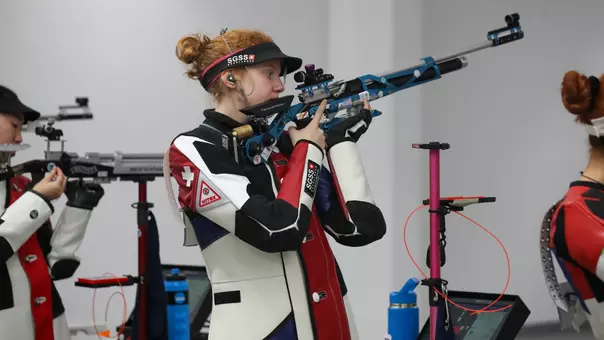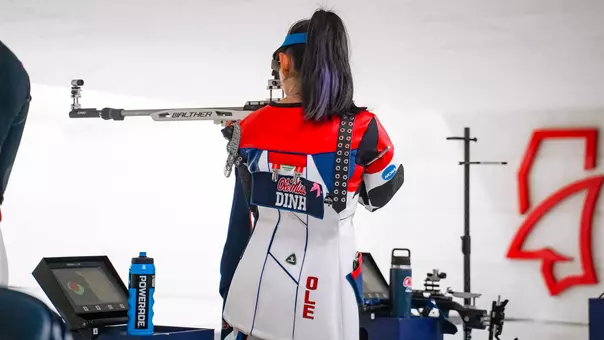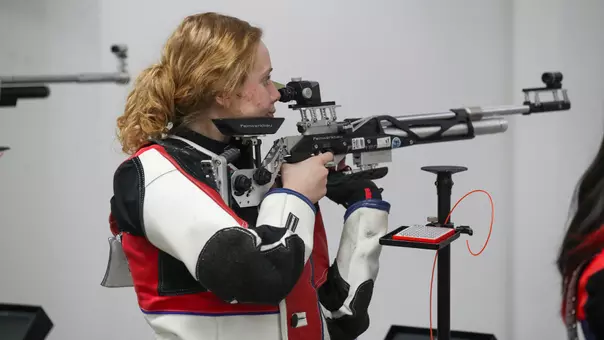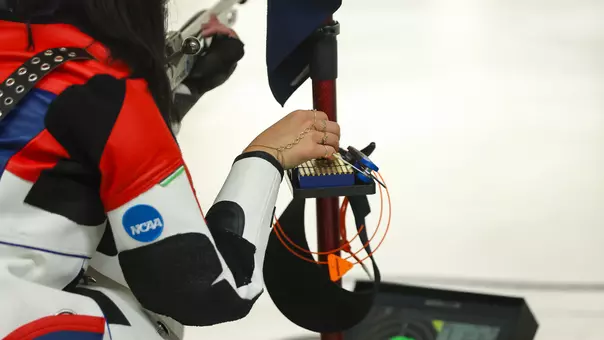The University of Mississippi Athletics
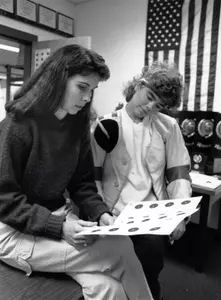
The New Normal of Ole Miss Rifle
9/19/2016 | Rifle
A new chapter has begun for the Ole Miss rifle team, and at the helm, the most decorated coach in NCAA rifle history is beginning a new chapter in her life as well.
After a decade-long hiatus from the sport, Marsha Beasley is back as just the second head coach in Rebel rifle history. Beasley previously led West Virginia University to eight national titles in a nine-year span before retiring in 2006, and she's ready to help the Ole Miss program take the next step.
"Our new motto is 'The New Normal,'" Beasley said. "That's on the back of the shirts that kids got at the welcome back party, the shirts said '#NewNormal.' We've talked about that. We want to step up the level of the program to a new normal and be better. That's what I'm wanting to do this year."
Beasley has gone on an interesting journey to become one of the most respected names in the sport. She started shooting at a young age, at first watching as her sister shot in a junior rifle club. The native Texan first shot at a summer camp, which was an adventure in and of itself.
"The summer camp didn't have a very knowledgeable instructor. I was completely missing the target because I was left-eye dominant, and nobody explained to me what I needed to do," Beasley recalled. "I ended up figuring it out myself by taking part of the cardboard ammo box and stuffing it in my glasses to block the vision in my left eye so I could aim with my right eye."
She shot throughout her youth, adding in dance classes, volleyball and lacrosse after moving to Wilmington, Delaware. While dance helped build her core strength and balance, volleyball and lacrosse enhanced her coordination. It all took away from her free time, pushing her to consider quitting rifle on multiple occasions. But support from her father, and a trip to nationals with a friend, kept her going and led her to compete at the collegiate level.
When Beasley attended East Tennessee State University, rifle hadn't yet reached the NCAA level, existing as a club sport through ROTC support. Beasley wasn't a star shooter at the collegiate level, but she learned a lot from the experience.
"I remember being really disappointed that I had a different coach every year, and some of them didn't really want the job of being a coach," she said of her college rifle experience. "And I remember thinking that the experience would be so much better if you had a coach who could do simple support things for the team. That's something that I think about still."
After graduation, Beasley landed with the National Rifle Association, which at the time ran the United States Olympic Committee's rifle program. After a decade with the NRA and Olympic program, fate landed Beasley at West Virginia University. The Mountaineers had won five national championships in the last seven years, but their coach, Ed Etzel, was ready to move on with his career.
Still, Beasley wasn't sure that coaching was her calling, but after some encouragement from the WVU coach, she took over NCAA Rifle's most successful program. Under Beasley, the Mountaineers dominated the 1990s, winning four NCAA crowns from 1990-93, finishing runner-up in 1994, and then adding four more titles from 1995-98. In her tenure in Morgantown, she coached 27 individual national champions, 25 All-Academic honorees and four Olympians.
She also coached her successor at WVU, current head coach and an Olympian in his own right, Jon Hammond, before retiring in 2006. In the years since, Hammond has carried on Beasley's legacy, adding five more national titles, giving the school an NCAA-leading 18.
In the meantime, Beasley focused on family. She watched her three children grow up and coached her son as a volunteer at the club level--and that ultimately led her back to coaching at the collegiate level. A trip to the University of Kentucky for a rifle match led to a conversation with the Wildcats' head coach, Harry Mullins.
As fate would have it, the very next day, Ole Miss executive associate athletics director Lynnette Johnson called Mullins. "I sat with the Kentucky coach and I said, 'You know, you're so lucky. I miss doing this. I love doing this.' I didn't even realize how much I missed it until I started getting back into it," Beasley said. "The very next day, Lynnette called him and said 'We've made the hard decision, and now we're looking for a coach, who should I call?'"
The question in Beasley's mind: was it too late to coach again? During her time away, the sport had graduated from paper to electronic targeting. Shooting is more technologically advanced than ever, and leading a collegiate program is, of course, about more than X's and O's. Mullins' advice: call on some help from the new generation.
"He said, 'You have to hire somebody young. You have to have a young assistant coach. You can do this,'" she recalled. "Fortunately, the athletic department gave me the chance to do this."
Beasley took her friend's advice and added former TCU standout Hannah Black as her assistant coach. During Beasley's hiatus, TCU had become a national staple in the sport, taking national championships in 2010 and 2012, and producing some exceptional talent, including Black, an All-American during her career.
Together, Beasely and Black are leading Rebel rifle into its next chapter and toward a new normal for the program.
"I'm hoping I can influence the program. And with Hannah's help and everybody's help, we can be better," Beasley said. " I want to get away from focusing on outcome and how are we ranked, how are we preforming and winning and losing, and keep the focus on improvement. We want to be better athletes, better team members, better every way we can."
Beasley will make her Ole Miss coaching debut Sept. 21 when the Rebels host the Ole Miss Open.








